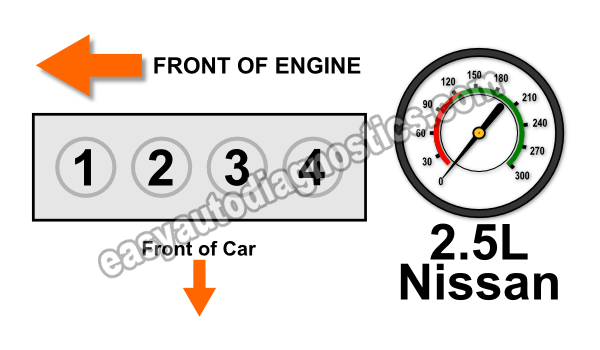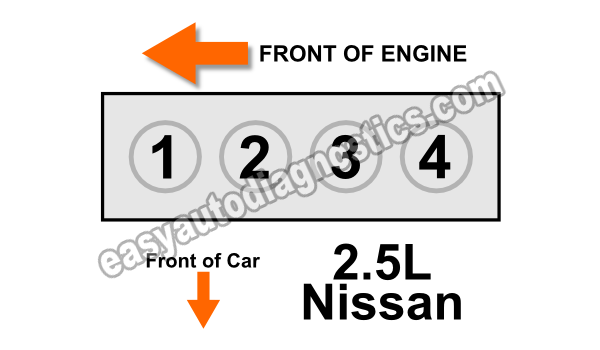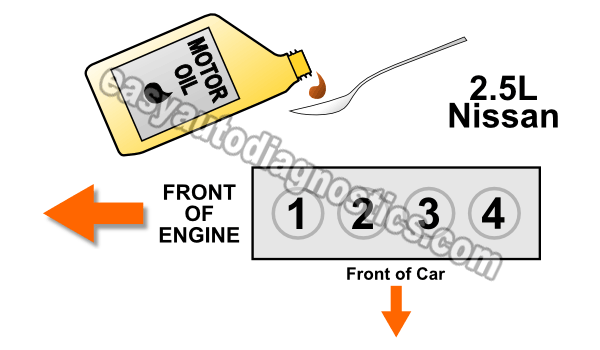
In this tutorial, I'll show you how to test the engine compression and more importantly, how to interpret the results of the test on your 2.5L equipped Nissan Altima (or Sentra).
Why do an engine compression test? Well, it will help you in two specific scenarios:
- A hard to diagnose engine miss (misfire).
- You might have already replaced a ton of stuff (spark plugs, ignition coils, fuel injectors, etc) and the engine is still missing and the problem may just be a cylinder with very low compression.
- A cranks but does not start condition.
- An engine with no compression will not start.
Contents of this tutorial:
Symptoms Of Engine Compression Problems
For the most part, engine compression problems cause one of two major types of problems:
- The engine cranks but doesn't start: This usually happens when all four cylinders don't produce enough compression to ignite the air/fuel mixture within them.
- The engine starts, but runs with a misfire or with a rough idle: This usually happens when one cylinder's compression is lower than the others.
When the engine starts and runs, but has a compression problem, you'll notice one or more of the following symptoms:
- Power Loss: Your car might feel sluggish or like it's just not as peppy as it used to be, especially when accelerating.
- Poor Fuel Economy: This bad gas mileage is caused by the engine running with an underperforming cylinder or cylinders (that aren't contributing equally to its overall power output).
- Misfiring Engine: The engine will misfire when you come to a stop and the engine runs at idle RPMs. As soon as you step on the accelerator pedal, the misfire disappears. You may also see one or more of the following diagnostic trouble codes illuminating the check engine light:
- P0300: Random Cylinder Misfire.
- P0301: Cylinder #1 Misfire.
- P0302: Cylinder #2 Misfire.
- P0303: Cylinder #3 Misfire.
- P0304: Cylinder #4 Misfire.
- Blue Exhaust Smoke: You may see blue smoke coming out of the tailpipe (as the engine runs or when you accelerate it).
- Strange Noises: You may hear knocking or tapping sounds coming from the engine.
Important Tips And Suggestions
TIP 1: The engine in your 2.5L Nissan Altima (Sentra) should be warmed up to get the most accurate engine compression test result from your compression test. I want to stress the words 'warm engine' because the engine should not be hot. This applies only if your Nissan starts and runs.
TIP 2: You'll be working around a cranking engine as you perform the engine compression test so take all necessary safety precautions. Your safety is your responsibility, so use common sense and think safety all of the time.
TIP 3: All of the spark plugs need to be removed from the engine for the compression test and this must never be done with a hot engine.
Why? The spark plug threads in the cylinder head can easily get damaged (as in getting stripped) and this is a nightmare you do not want to experience.
Which Compression Tester Should I Buy?
There are lot of engine compression testers to choose from and many places to buy them. I'm gonna' make some recommendations to you:
Disclosure: As an Amazon Associate, I earn from qualifying purchases. Buying through these links helps support this site at no extra cost to you. Thanks for your support —it really means a lot!
TEST 1: Dry Compression Test

When doing an engine compression test, the first test is done 'dry'. Which means you simply remove the spark plugs and check each cylinder's compression.
The second test done is a 'wet' compression test. In this second test, you add a few drops of engine motor oil to the cylinders that registered low or 0 compression.
OK, to get started this is what you'll need to do:
- 1
Remove the spark plugs from a slightly warmed up engine (if it starts and runs). Remember, the engine can not be hot.
When removing the spark plugs, be careful not to drop any of them on the floor, or you run the risk of having the spark plugs porcelain insulator crack and then you'll have a misfire on your hands.
If the engine does not start, don't worry about it being warmed up. - 2
Disable the fuel system by removing the fuel pump fuse. Disabling the fuel system will prevent fuel from being injected into each cylinder when the Test is performed.
- 3
Thread the engine compression gauge into the spark plug hole for the number 1 engine cylinder. Hand tighten the compression gauge only! Do not use any type of tool to get it tight.
- 4
Have your helper crank the engine till the needle on the compression gauge stops climbing.
Now, record on paper the value at which the needle stopped and the number of the engine cylinder on a piece of paper. Release the pressure on the gauge and repeat this step one more time.
Repeat this test step on the remaining 3 cylinders.
Let's take a look at what your test results mean:
CASE 1: Your vehicle does NOT start and you got 0 PSI on all cylinders. This test result usually means that the engine has a serious internal mechanical problem.
The engine might have one of the following:
- Timing chain problem.
- Blown head gasket problem.
- Engine threw a rod.
Any compression value below 100 PSI (even if it is not 0 PSI) means internal mechanical engine trouble.
CASE 2: The compression values differ from one another. This could be normal or it could be causing a problem.
To find out if the low compression values are withing a normal range or not, go to: Interpreting The Results Of The Engine Compression Test.
CASE 3: All 4 cylinders have a compression value of less than 100 PSI. This indicates an internal engine problem.
This test result is usually caused by one of the following:
- Timing chain problem.
- Worn piston rings.
- Worn cylinder head valves.
Interpreting The Results Of The Engine Compression Test
There's a good chance that the compression values you wrote down for each cylinder are slightly different from one another. This could normal and nothing to worry about yet or it could be a problem.
What could cause a problem is if the cylinder compression values vary too much. The cool thing is that we can find out if the variations in the values, you wrote down, indicate a problem (with that cylinder) or not.
The rule of thumb is that they can not vary more than 15% from each other and if they do, you're gonna' have a genuine misfire condition on your hands or possibly a no-start condition (if more than one cylinder is affected).
How do you figure this out? You can find out by using my online low compression calculator here: Online Low Engine Compression Calculator or manually this way:
- STEP 1: Multiply the highest compression value by 0.15 (this is the decimal value of 15%).
- STEP 2: Round the result to the nearest one (for example: 25.6 would become 26).
- STEP 3: Subtract the result (the number that was rounded) from the highest compression value.
- ANSWER: The result of this subtraction is the lowest possible compression value any cylinder can have.
To make better sense of the above calculation, let's say that my 2.5L Altima produced the following compression test results:
| Cylinder | Pressure |
|---|---|
| #1 | 175 PSI |
| #2 | 170 PSI |
| #3 | 165 PSI |
| #4 | 120 PSI |
The next step is to do the math:
- STEP 1: 175 x 0.15 = 26.25.
- STEP 2: 26.25 = 26.
- STEP 2: 175 - 26= 149.
- ANSWER: 149 PSI is the lowest possible compression value.
Since cylinder #4 is producing 120 PSI, I can conclude that it's the one causing the misfire. The next step is to find out what's causing the low compression value. Go to: TEST 2: Wet Compression Test.
TEST 2: Wet Compression Test

If in TEST 1 you got one (or more cylinders) with very low engine compression, your next step is to do a 'wet' engine compression test.
The wet compression test will help you pinpoint the problem (of the low compression test result) to the cylinder head valves or the piston rings.
Doing a wet engine compression test simply involves adding about 1 to 2 tablespoons of motor oil to the cylinder with low compression and then check its compression once again (with your compression tester).
At the bottom, I'll show you how to interpret your test results.
OK, this is what you'll need to do:
- 1
Add a tablespoon of engine oil in the cylinder you need to retest. I suggest using a small and long funnel so that the oil will reach the inside of the cylinder.
- 2
Once you've added the oil, install the compression gauge and as before just hand tighten it.
- 3
Now, have your helper crank the engine till the needle stops climbing on the compression gauge.
- 4
You'll see one of two results:
1.) The needle will climb higher than the previous compression number you recorded for this specific cylinder.
2.) The needle will not move at all or stay at the same number you recorded earlier.
Whatever value your compression tester reads, write it down again. - 5
Repeat steps 1 thru' 4 on any other cylinder that gave you a low compression value.
Let's take a look at what your compression test results mean:
CASE 1: The compression tester registered a higher value. This compression test result confirms that the low compression value registered in this cylinder in the dry test is due to worn piston rings.
CASE 2: The compression tester DID NOT register a higher value (than the previous recorded value). This result tells you that the low compression value registered in this cylinder in the dry test is due to worn/damaged cylinder head valves.
Related Test Articles
To see all of the 2.5L Nissan specific articles, go to: Nissan 2.5L Index Of Articles.
Here's a sample of the articles, you'll find in the Index of Articles:
- Coil-On-Plug (COP) Coil TEST 2.5L Nissan Altima, Sentra (2002-2006).
- How To Test The Fuel Injectors (2.5L Nissan Altima, Sentra).
- Testing A Bad Alternator: Symptoms And Diagnosis.
- How To Bench Test The Starter Motor.
- How To Troubleshoot a Blown Head Gasket (2.5L) (at: troubleshootmyvehicle.com).

If this info saved the day, buy me a beer!





